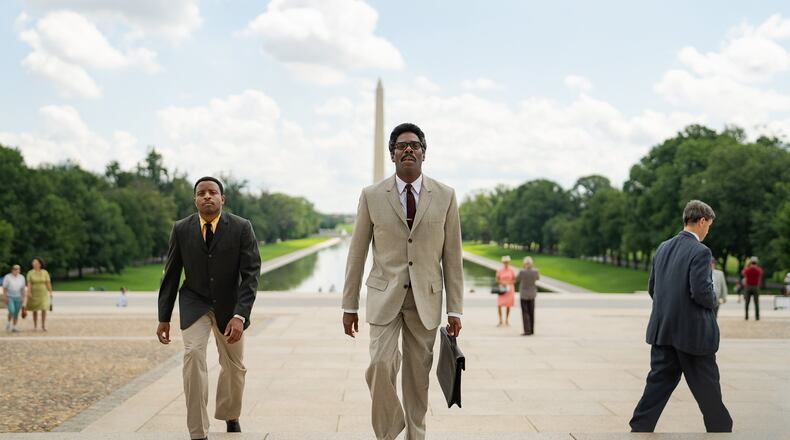Unlike civil rights legends such as the Rev. Martin Luther King Jr., Medgar Evers, Rosa Parks and John Lewis, Bayard Rustin is not a household name six decades after the March on Washington.
Yet Rustin was a key figure in organizing that seminal peaceful protest, a march that drew a whopping 250,000 people in just a matter of weeks. He was also a man who overcame numerous obstacles as a Black gay man and former Communist Party member.
That is why Barack and Michelle Obama’s production company Higher Ground chose to make the Netflix biopic “Rustin,” in a handful of local theaters now and available Nov. 17 on the streaming service. They brought in George C. Wolfe, a Tony-winning director who had also directed 2020′s critically acclaimed “Ma Rainey’s Black Bottom,” to direct the project. He was also chief creative officer of the National Center for Civil and Human Rights in Atlanta for five years.
“I wanted to capture the essence of a human being deeply committed to human beings,” said Wolfe in a phone interview with The Atlanta Journal-Constitution. “Bayard Rustin was passionate about civil rights and empowering the young. He was a brilliant organizer. It’s very easy to claim the title of activist but there’s work behind that. I wanted to celebrate the rigor and the intellect and the way in which he exercised that title.”
Colman Domingo (”If Beale Street Could Talk,” “Euphoria”) plays Rustin in the movie with barrels of cheer, charisma and drive. But Rustin’s frustrations and anger lurk just beneath the surface, sometimes appearing when properly triggered.
In a scene partway through the movie, Rustin loses his temper when a fellow white employee at his office blames King for Black youth being attacked by police dogs and firehoses in Birmingham, Alabama.
Another white man tries to calm Rustin down by saying, “Every day we agree to surrender that which makes us different.”
“I can’t surrender my differences!” Rustin says. “The world won’t let me. And even if I could, I wouldn’t want to. Not today!”
The film addresses the nuanced interplay between King (Aml Ameen) and Rustin. In 1960, the Atlanta preacher cut off Rustin under pressure from many Black power brokers including Roy Wilkins (Chris Rock), head of the NAACP, who actively tried to shove Rustin to the side.
But King and Rustin reunited for the March on Washington. Wolfe said they both knew how strong they were as a team.
“On your own, you and Martin are fine,” Ella Baker (Audra McDonald), a fellow civil rights activist, told Rustin in the movie, “But together, you are fire.”
Wolfe said King “recalibrated their friendship. He ultimately defends and honors and respects his friend.”
Credit: Parrish Lewis/NETFLIX © 2023
Credit: Parrish Lewis/NETFLIX © 2023
The film also brought in a composite character, a closeted gay preacher married to a woman, who has a love affair with Rustin.
“Rustin didn’t hide the fact he was gay,” Wolfe said. “He was too busy doing work. His grandmother who raised him gave him permission to be who he was.”
While shooting and scouting locations in D.C., he said he had 50 professionals working for him. “Bayard and a team of kids did something even bigger without the Internet, without cell phones, without any of that,” he said. “Let’s take a moment and be in awe of his accomplishment.”
The film ends as the March on Washington concludes. Ten civil rights leaders are able to meet with President John F. Kennedy. Rustin is not one of them. Instead, he quietly helps clean up trash.
“There’s a degree of elegance to it,” Wolfe said. “As a prime organizer, he helped clean up without a single complaint. That speaks to his dignity and elegance and his sense of responsibility.”
Though the movie concludes in 1963, Rustin lived for another 24 years as a dedicated activist for both civil rights and gay causes. But he never quite became a revered household name in his lifetime. Wolfe said Rustin had mixed feelings about his legacy.
“I wouldn’t say he didn’t care,” Wolfe said. “At the same time, I wouldn’t say he cared either. Being of service is a challenging thing. Sometimes the moment is about you. Sometimes it isn’t. Ultimately, Martin Luther King became an international phenomenon, not Rustin. It was complicated.”
HOW TO WATCH
“Rustin”
Streaming on Netflix
About the Author
Keep Reading
The Latest
Featured




